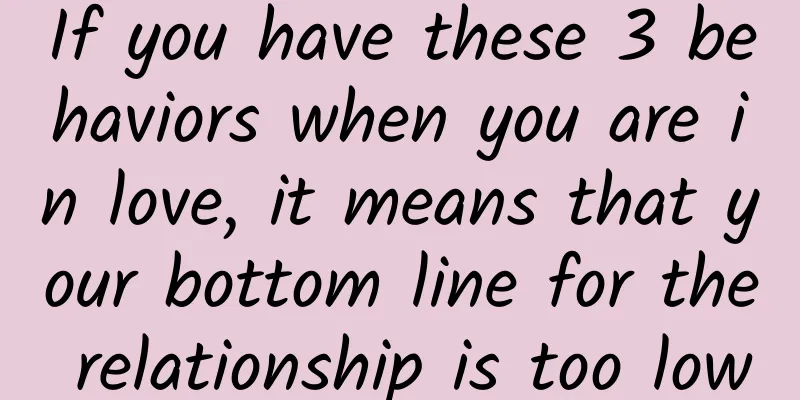If you have these 3 behaviors when you are in love, it means that your bottom line for the relationship is too low

|
In order to save his/her affection, would you compromise yourself? If you think about this question, it is probably because in a relationship, you are often the first to give in, sacrificing your own emotions and needs to accommodate the other person. Even in a relationship with friends or colleagues, you are often the one who tolerates and compromises. Even if you have different ideas, you dare not put them forward for fear that the other person will be unhappy. In psychology, these are considered signs of low relationship standards. Relationship standards refer to a person's expectations and beliefs about how interpersonal relationships, especially intimate relationships, should develop and be maintained, such as expectations of a partner, views on the nature of the relationship, and expectations of behavior in the relationship. Healthy relationship standards mean that our needs are respected and met, while too low relationship standards often lead to our needs being suppressed. So can we save our relationship by compromising ourselves? On the contrary, research shows that when we overly lower and compromise our relationship standards, it will reduce relationship satisfaction and make it easier to break up. Copyright images in the gallery. Reprinting and using them may lead to copyright disputes. Today, let’s talk about common manifestations of low relationship standards in romantic relationships, and why we always give in and compromise without any bottom line. 3 signs that your relationship bottom line is too low Each of us has our own internal standards for romantic relationships. These internal standards determine how we view the other person, what behaviors of the other person are acceptable and unacceptable, and how we hope that the other person will show love. As the saying goes, "Beauty is in the eyes of the beholder." This actually means that when we are in the passionate love period, some relationship standards will be temporarily lowered, and we will become more tolerant, and even if the other person does something stupid, it will look cute. But once the passionate love period is over, the relationship standards will also be restored, and then we will find that "it turns out that the other person is not perfect either." If our relationship standards are healthy, it can help the two parties in love to adjust in a positive direction until they reach a more balanced mode of getting along. However, if our internal relationship standards are too low, the two sides will continue to be in an unbalanced state, leading to frequent quarrels, cold wars, and even repeated breakups. Specifically, there are three main manifestations of low relationship standards. 1 Deliberately avoid conflict and often choose silence This is the most obvious manifestation of low relationship standards, because insisting on or expressing your own opinions may lead to conflicts between the two parties, which will make you feel strongly uneasy and afraid of affecting the relationship between the two parties. Deep down, you may also be afraid that the other party will abandon you. Therefore, when there are differences of opinion, you would rather choose to compromise and show an evasive attitude. For example, when there is a disagreement about the division of household chores, you may say, "Forget it, I'll do it myself. There's no point arguing anyway." Long-term avoidance of conflicts will accumulate a lot of improperly dealt with memories and negative emotions in our hearts. Every time you tell yourself: "It will pass if you bear with it", but in fact the problem is not solved, these long-suppressed emotions may eventually erupt suddenly in a small quarrel and become the fuse for a breakup. 2 Ignore yourself and prioritize satisfying the other person When we are in love, we all put the needs of the other person first, which is a basic feature of an intimate relationship. Appropriate compromise helps maintain a healthy relationship. However, when only one party constantly makes compromises without mutual reciprocation, this will drain all of a person's psychological energy and make it impossible to establish a healthy relationship. There are two main manifestations of imbalance in the satisfaction of the needs of both parties: · Suppressing your own needs : You may habitually think that the other person's needs are more important than your own, and ignore your own feelings. For example, if the other person wants to travel, even if you don't want to go or want to go to a different place, you still want to cater to and accommodate the other person's ideas. Over time, this situation often leads to your needs not being respected and met, and you gradually feel that your ideas seem to be unimportant in the other person's mind, and you seem to feel helpless or even indifferent about it. · Rationalizing bad behavior : When we always prioritize meeting the needs of others, we may show an overly “considerate” attitude, which means that when the other person shows some disrespect or disappoints you, you always make excuses for him/her, such as always forgetting important anniversaries, often getting emotional with you, and you will only think that “he/she has been under a lot of work pressure recently”, “he/she didn’t mean it”, “he/she is usually very nice to me”, etc., instead of thinking that the other person shouldn’t treat you like this. This unconscious way of making excuses for the other person can only temporarily relieve our inner anxiety, but it will make us become more and more numb to our own feelings. 3 Self-denial, thinking the problem is oneself When couples quarrel, some people tend to doubt themselves. The first thought that comes to their mind is "Is there something I didn't do well enough?" This is actually a manifestation of low relationship standards. Once the relationship fluctuates, the first reaction is to think that the problem lies with oneself, and even take the initiative to take responsibility when there is no fault. For example, if the other party is a little cold to you, you immediately think it is your problem, maybe you are too clingy, or you said something wrong, instead of asking the other party what happened. How relationship standards are formed If the relationship standards are too low, there is often a tendency to "repeat the same mistakes", because people tend to have a relatively stable set of relationship standards when they grow up, which will be reflected in various interpersonal relationships, including relationships with parents, friends, colleagues and partners. The formation of this relatively stable set of relationship standards often stems from our growth experience, the influence of family environment and personal character traits. Copyright images in the gallery. Reprinting and using them may lead to copyright disputes. Attachment theory holds that the relationship pattern with caregivers in childhood will affect the individual's emotional relationship in adulthood. If there is no stable emotional support in childhood, an anxious attachment pattern will be formed. In adulthood, the individual will be very afraid of losing close relationships and believe that maintaining harmonious relationships is more important than expressing self-needs. Some people with low relationship standards may be influenced by their family environment. For example, witnessing their parents' frequent quarrels since childhood may make them extremely resistant to conflict. They may associate conflict with pain and separation, and tend to avoid all occasions that may cause conflict when they grow up. Such people would rather sacrifice themselves in intimate relationships and hope to maintain superficial calm through repression. Low relationship standards may also be related to low self-esteem. People with low self-esteem often think deep down that they are not good enough and do not deserve to be loved, which leads to their tendency to over-give and compromise in romantic relationships. They try to gain love and recognition by catering to their partners, and believe that only by sacrificing themselves can they prove their value in the relationship. How to reshape relationship standards Relationship standards are often formed gradually over a long period of experience in the past. We can also gradually adjust our relationship standards in the future so that we don't repeat the same mistakes and always compromise and sacrifice ourselves. The following methods can help you learn to respect yourself, listen to your inner voice, and establish healthy relationship standards. 1 Self-awareness and dialogue We need to learn to recognize our own value. In interpersonal relationships, while respecting each other, we also understand that our own needs are equally important. We can find some quiet time for self-reflection and have self-dialogues. Write them down in a notebook or mobile phone, record our needs and feelings, for example, ask yourself, "Among the compromises and concessions I have made in the past, which ones were out of fear of loss, and which ones were because I was really willing to pay for the relationship." Through these self-dialogues, we can gradually increase our awareness of our own needs and enhance our sense of self-worth. 2 Learn to set boundaries In an intimate relationship, healthy boundaries are the key to maintaining a balanced relationship. Learn to say "no" when appropriate and express your needs and feelings clearly. Boundaries do not mean alienation, but to protect yourself and your partner, so that both of you have a comfortable space in the relationship. You can start with small things and gradually establish clear boundaries between you and your partner, such as sticking to your own ideas when it comes to time arrangements or personal preferences. 3 Practice healthy communication styles Many people choose to compromise because they are afraid of conflict with the other party and damaging the relationship between the two parties. But in fact, it is not the conflict that hurts the relationship, but the unhealthy communication method. If we can adopt healthy communication methods, we can help both parties understand each other better when resolving conflicts. There are many healthy communication methods, such as using the sentence pattern of "I feel..." to express your feelings instead of blaming the other party, such as "I feel ignored" instead of "You never care about me." This method helps to reduce the confrontation of the conflict, allowing you to express your needs in communication without exacerbating the conflict. A true intimate relationship does not require one party to compromise unconditionally, but rather both parties can grow, support and achieve each other in each other's company. It may take long-term efforts to recognize that one's own relationship standards may be too low and gradually make adjustments and changes, but each step can bring us closer to our strong and independent selves, so that we can have an intimate relationship that respects each other and is true to ourselves. References [1] Fletcher, GJ, & Simpson, JA (2000). Ideal standards in close relationships: Their structure and functions. Current Directions in Psychological Science, 9(3), 102-105. [2] Campbell, L., Simpson, JA, Kashy, DA, & Fletcher, GJ (2001). Ideal standards, the self, and flexibility of ideals in close relationships. Personality and Social Psychology Bulletin, 27(4), 447-462. Planning and production Author: ACC Psychology Popular Science Reviewer: Yang Xiaoyang, Associate Professor, School of Psychology, Sichuan Normal University Planning丨Ding Zong Editor: Ding Zong Proofread by Xu Lailinlin |
>>: Drinking too much of these teas can actually harm your health? Don’t drink too much!
Recommend
Advertising landing page optimization rules!
We all know that the key to a landing page is tha...
SIA: Global semiconductor sales will grow to $574 billion in 2022, with a compound annual growth rate of 6.67%
The Semiconductor Industry Association (SIA) rele...
I get scared as soon as I enter the elevator. Is this also a psychological problem?!
Review expert: Li Xianhong, national second-level...
The earliest urban planning in modern China turned out to be a little-known
Author: Liu Su, Professor of School of Architectu...
Who “painted” those colors in the fireworks?
When the colorful fireworks bloom in the dark nig...
You were busy celebrating the National Day, but these big things happened in the technology circle
[[151069]] Large companies October 3: Google offi...
Lezi's "Practical Course on Making Money with Tik Tok Short Videos"
A practical course on making money with short vid...
Qingming Festival is coming soon, come and have a taste of spring!
Mixed Knowledge Specially designed to cure confus...
How much does it cost to recruit investors for Qiqihar Pipe Fittings Mini Program?
How much is the investment price in Qiqihar pipel...
Jikongjian new Z4 review: It is not only a home digital hub, but also a work, life and entertainment center
The evolution of information storage methods runs...
React chapter of the front-end interview handbook, dismantling the real interview questions of large companies and conquering the core test points of React
React chapter of the front-end interview handbook...
Its density is lower than that of air, so it is a magical tool for keeping warm and insulating!
In the process of human history development, the ...
What is the Pomegranate Algorithm? How to deal with the pomegranate algorithm?
From the perspective of the entire Internet ecosy...
"Boys take after their moms, girls take after their dads"? Who do children inherit their IQ from? Experts say...
You can often hear people say: “Boys take after t...









